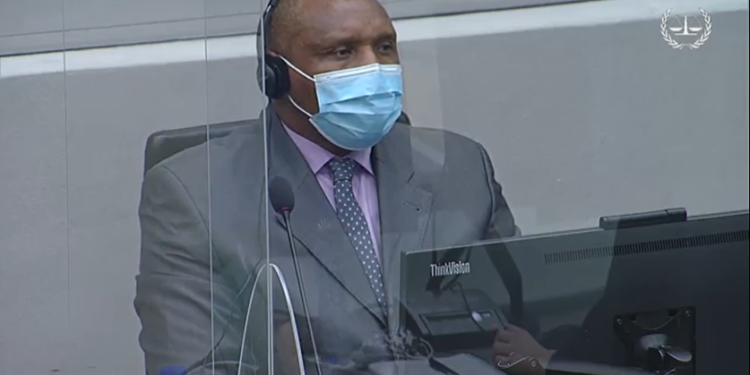Congolese warlord Bosco Ntaganda has been ordered to pay USD 30 million to the victims of his crimes in Ituri, Democratic Republic of the Congo, between 2002 and 2003.
In its reparations order issued on Monday, Trial Chamber VI of the International Criminal Court notes that “priority should be given to individuals who require immediate physical and/or psychological medical care, victims with disabilities and the elderly, victims of sexual or gender-based violence, victims who are homeless or experiencing financial hardship, as well as children born out of rape and sexual slavery and former child soldiers”.
Ntaganda, in a grey suit, purple shirt, dotted tie, and blue surgical mask, listened impassively as the presiding judge in the reparations proceedings, Chang-ho Chung, read the order. In 2019, he was convicted of war crimes and crimes against humanity, and sentenced to 30 years in prison.
“The Chamber stresses that in reaching this decision it particularly took into account the victims’ wish not to be granted any form of memorialisation or other forms of symbolic reparations unless they serve practical purposes, and their wish to receive awards aiming at supporting sustainable and long-term livelihood and well-being, rather than simply addressing their needs on a short-term basis. The Chamber has thus concluded that collective reparations with individualised components are the most appropriate way of addressing the harms caused by the crimes for which Ntaganda was convicted and the long-term needs of the victims,” the judge said.
Reparations aim to reinstate victims to the situation they were before the commission of the crimes that affected them. The assistance may include preventative, curative, and rehabilitative medical services; general rehabilitation and housing; psychosocial rehabilitative services; re-integrative and social services; community and family-oriented assistance and services; vocational training and education, along with micro-credits and income-generating opportunities.
The court found Ntaganda indigent [financially incapable] and requested that the Trust Fund for Victims (TFV) contribute to the reparation awards, both within its available resources and additional fundraising efforts.
In a statement, TFV welcomed the judgement, noting that the order was a significant step in ensuring justice for the victims and recognition of the harm they had suffered. The fund also pledged to ensure that the victims received the reparation awards as cited by the court.
“This decision marks the beginning of the implementation phase of reparations. The TFV will develop an implementation plan as ordered by the court. In order to address the most vulnerable victims, the TFV will propose urgent action within the time frame set by the Chamber. The TFV is conducting an in-depth analysis of the order and will provide information on the next steps in due course,” read the press statement.
The Trust Fund for Victims has until June 8 to submit an urgent plan for the priority victims and September 8 to submit a draft implementation plan.
TFV has launched two phases of the assistance programme – the first phase [2008 to 2017] and the second phase in July 2020, with 10 new projects.
In the sentencing judgement of November 2019, the three judges unanimously convicted Ntaganda, nicknamed “Terminator”, of five counts of crimes against humanity and 13 counts of war crimes. However, they argued that despite the magnitude of his crimes and the level of his involvement, the crimes “do not warrant a sentence of life imprisonment.” Ntaganda’s is the longest prison sentence ever handed down by the ICC.
There have been four convictions and sentences for war crimes and crimes against humanity under the jurisdiction of the ICC. Ntaganda’s case is the first one in which the court has convicted a military commander for rape and sexual slavery against his own troops.
Read the reparations order: https://www.icc-cpi.int/Pages/record.aspx?docNo=ICC-01/04-02/06-2659
Related articles:







